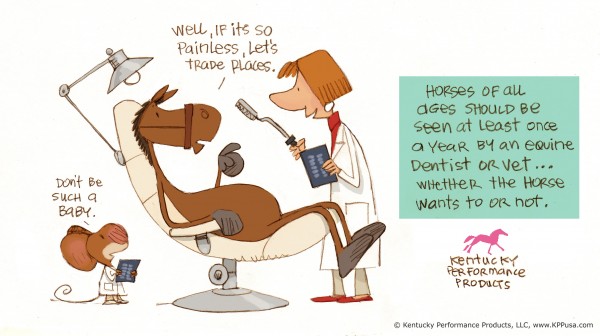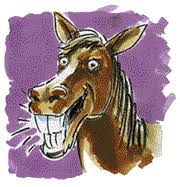
Could my Horse have a Tooth Issue?
Do they exhibit any of these symptoms?
- Weight loss.
- Bolts his food or eats it unusually slow.
- Dribbles his feed or drops feed half-chewed from his mouth.
- Drools or salivates excessively.
- Chooses to eat hay before grain.
- Tilts or shakes his head while chewing his feed.
- Tongue, lips or gums develop sores.
- Manure contains un-digested grain kernels or pieces of hay.
- Resistant to drink cold water.
- Bad odor from his mouth or nostrils.
- Pulls his head to one side or rears while riding.
- Carries his tongue abnormally.
- Shakes head
If you are seeing these symptoms, you need to find a dentist.

What causes dental issues?
The horse is a grazing animal by nature, and his teeth are designed to select and chew grasses—often coarser stuff than that found in lush pastures. The process of mastication (grinding) wears away the tooth enamel, and as a result, the horse evolved with self-replenishing dental work. Domestication disrupted Nature's balance, and most modern horses consume a diet that consists of large amounts of concentrates (grain) and hay, with limited opportunities to graze. Chewing hay and grain is less natural for the horse than chewing grass. It limits the movement of the lower jaw, and the process of chewing grain also requires a more up-and-down jaw action than that of chewing forage. A common result is the development of sharp enamel edges, most often along the inside edges of the lower teeth and along the outside edges of the upper teeth.
Why Worry About Teeth?
Okay, so your horse's teeth weren't designed to chew hay and grain. He's not likely to be mountain lion bait these days, and he doesn't need a dazzling smile to win ribbons. So why worry about dental care?
Because if you don't, you might find yourself with one or more health or performance problems on your hands. On the health side, Emerson and Auman say they've seen cases of malnutrition, weight loss, chronic colic, cheek and tongue ulceration, glossitis (an inflamed, swollen tongue), periodontal disease, choke, and even an inability to eat—all resulting from insufficient dental care. On the performance side, dental discomfort can manifest itself as head-tossing, head-shyness, resistance to being bridled, evasion of rein contact, lugging on one or both reins, overflexing (going "behind the bit"), a head-up/hollow-backed way of going, and even rearing or going over backward in extreme cases. Not surprisingly, tooth and mouth pain also can cause irritable behavior.
Auman emphasizes that the symptoms of other physical problems and diseases can look much like those of dental difficulties. However, given the numbers of horses he sees with poorly maintained teeth (he estimates that 80-90% of the horses on which he conducts prepurchase exams are in need of dental care), he's quick to suspect dental discomfort as a possible cause of suspicious behavior or physical symptoms. As he points out, "It's pretty easy to tell whether a problem is indeed related to the teeth, particularly in the case of a performance or behavioral problem—when the teeth are fixed, the problem goes away."
Eating difficulties also are telltale signs of teeth or mouth problems—spilling grain while chewing, dunking hay or feed in the water bucket, holding the head to one side while eating, bolting grain, or dropping partially chewed balls of food. Excess salivation, foul breath, and facial swelling can also indicate discomfort or infection.
From the Author:
Dentistry is an important part of my care routine with my horses. Good dental care is essential for optimal feed utilization and performance. I have seen drastic changes in both my horses condition and behavior following dental work. Feeding horses is expensive, but feeding horses with bad teeth is a complete wasted effort. Dental work is definitely one of my number 1 checkpoints with problem horses.

From the Author:
Dentistry is an important part of my care routine with my horses. Good dental care is essential for optimal feed utilization and performance. I have seen drastic changes in both my horses condition and behavior following dental work. Feeding horses is expensive, but feeding horses with bad teeth is a complete wasted effort. Dental work is definitely one of my number 1 checkpoints with problem horses.
No comments:
Post a Comment